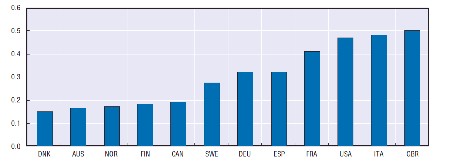The United States sells itself as the land where women and men can rise from humble origins to the highest offices in the land. Americans describe the triumphs of Abraham Lincoln, the president who was born in a log cabin, and Bill Clinton, the president who was born in a trailer park.
While the United States embraces these great examples, the truth is that even modest, upward social mobility in the United States is rare and growing rarer. In short, the American dream is, in fact, a dream.
This is the finding of a recent study by the Organization for Economic Cooperation and Development (OECD). Comparing intergenerational earning within the Member States of the OECD, Northern European social democracies (Denmark, Norway and Finland), Australia and Canada are significantly more meritocratic societies. There, individuals' wages are not strongly related to those of their parents. At the opposite end of the social mobility scale is Italy, Great Britain, and the United States. In these countries, the children of the poor are far more likely to remain poor while the children of the rich are far more likely to stay rich. France, albeit a country with a highly redistributive social model, follows closely behind this group.
Table: Variation of the link between individual and parental earnings across OECD countries

Comment: The height of each bar measures the extent to which sons' earnings levels relate to those of their fathers. The higher a bar is, the greater is the persistence of earnings across generations, thus showing how difficult it is for sons to earn more than their fathers. If Denmark appears to be the most meritocratic of the OECD countries, individuals' wages are strongly related to those of their parents in the United States, Italy and Great Britain.
Source: A.C d'Addio (2007), "Intergenerational Transmission of Disadvantage", OECD Social, Employment and Migration Working Paper No. 52
Of course, in any of these countries, it's most convenient to be born to wealth if you seek wealth yourself. Everything follows from it: a better social environment, better schools, better jobs, better wages, and better prospects for your own children.
But while we have long believed that the true meritocratic states, those where one could climb the social ladder based on merit and talent, were countries where individual freedom and small government were prevalent, this study shows that it is actually, quite clearly, the opposite. For merit to pay off, the state must intervene.
This is especially true when it comes to education, a key factor when analyzing intergenerational wages inertia. A study by the Programme for International Student Assessment evaluated 15-year-old school children's scholastic performance in OECD Member States, and found a strong correlation between the performance of the children and the level of state interventionism. There again, the U.S. did not shine by its ranking.
Discrepancies in the performances of the secondary education systems are relevant, it is even more so when connected with social mobility. From all the countries that have been studied, the United States is the one where the gap between the academic performance of wealthy and poor families remains the widest, as if American education was not good enough to help the intellectual and social elevation of the children with a humble background. At the opposite end, Canada, South Korea and the Scandinavian countries are where the children have, despite belonging to different social classes, the most similar results, thus showing that the education they are receiving is comparable whether they are from a rich or poor background.
Some would assert that a more redistributive policy aiming at enhancing mobility across generations would impede economic growth because of the tax increase it would entail. However, right after the children, the principle victim of this intergenerational reproduction of the inequalities is the economy. Less socially mobile societies are more prone to waste or misuse talents, skills and abilities which is a tremendous disadvantage considering that one of the key factor of economic competitiveness in a globalized world is human capital and intelligence. The lack of equal opportunities also affects the motivation and level of commitment of citizens, which in turn decreases the labor productivity, and negatively affects the growth potential of an economy -- not to mention heavy social price generated by unequal opportunities. Economic and social marginalization leads to violence and insecurity which threaten the core of a nation: the ability to live altogether in the same country, sharing the same American Dream.
